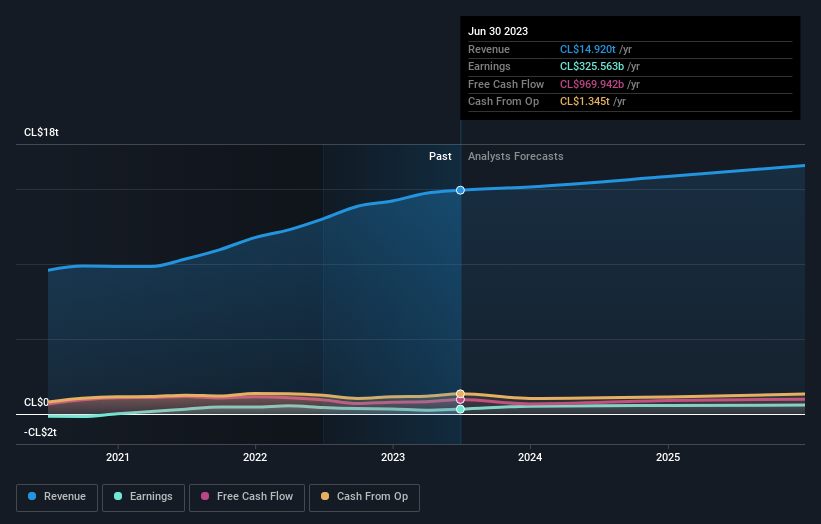Stock Analysis
- Chile
- /
- Food and Staples Retail
- /
- SNSE:CENCOSUD
Cencosud S.A.'s (SNSE:CENCOSUD) market cap dropped CL$157b last week; individual investors who hold 52% were hit as were institutions

Key Insights
- The considerable ownership by private companies in Cencosud indicates that they collectively have a greater say in management and business strategy
- The largest shareholder of the company is PK One Limited with a 52% stake
- Institutions own 24% of Cencosud
To get a sense of who is truly in control of Cencosud S.A. (SNSE:CENCOSUD), it is important to understand the ownership structure of the business. And the group that holds the biggest piece of the pie are private companies with 52% ownership. That is, the group stands to benefit the most if the stock rises (or lose the most if there is a downturn).
While the holdings of private companies took a hit after last week’s 3.2% price drop, institutions with their 24% holdings also suffered.
Let's take a closer look to see what the different types of shareholders can tell us about Cencosud.
View our latest analysis for Cencosud

What Does The Institutional Ownership Tell Us About Cencosud?
Institutional investors commonly compare their own returns to the returns of a commonly followed index. So they generally do consider buying larger companies that are included in the relevant benchmark index.
As you can see, institutional investors have a fair amount of stake in Cencosud. This suggests some credibility amongst professional investors. But we can't rely on that fact alone since institutions make bad investments sometimes, just like everyone does. It is not uncommon to see a big share price drop if two large institutional investors try to sell out of a stock at the same time. So it is worth checking the past earnings trajectory of Cencosud, (below). Of course, keep in mind that there are other factors to consider, too.

Hedge funds don't have many shares in Cencosud. The company's largest shareholder is PK One Limited, with ownership of 52%. This essentially means that they have extensive influence, if not outright control, over the future of the corporation. With 5.0% and 2.5% of the shares outstanding respectively, JPMorgan Chase & Co, Private Banking and Investment Banking Investments and Administradora de Fondos de Pensiones Habitat S.A. are the second and third largest shareholders.
Researching institutional ownership is a good way to gauge and filter a stock's expected performance. The same can be achieved by studying analyst sentiments. There are plenty of analysts covering the stock, so it might be worth seeing what they are forecasting, too.
Insider Ownership Of Cencosud
While the precise definition of an insider can be subjective, almost everyone considers board members to be insiders. Company management run the business, but the CEO will answer to the board, even if he or she is a member of it.
Insider ownership is positive when it signals leadership are thinking like the true owners of the company. However, high insider ownership can also give immense power to a small group within the company. This can be negative in some circumstances.
Shareholders would probably be interested to learn that insiders own shares in Cencosud S.A.. It is a pretty big company, so it is generally a positive to see some potentially meaningful alignment. In this case, they own around CL$118b worth of shares (at current prices). Most would say this shows alignment of interests between shareholders and the board. Still, it might be worth checking if those insiders have been selling.
General Public Ownership
With a 21% ownership, the general public, mostly comprising of individual investors, have some degree of sway over Cencosud. While this group can't necessarily call the shots, it can certainly have a real influence on how the company is run.
Private Company Ownership
We can see that Private Companies own 52%, of the shares on issue. Private companies may be related parties. Sometimes insiders have an interest in a public company through a holding in a private company, rather than in their own capacity as an individual. While it's hard to draw any broad stroke conclusions, it is worth noting as an area for further research.
Next Steps:
While it is well worth considering the different groups that own a company, there are other factors that are even more important. For instance, we've identified 4 warning signs for Cencosud that you should be aware of.
Ultimately the future is most important. You can access this free report on analyst forecasts for the company.
NB: Figures in this article are calculated using data from the last twelve months, which refer to the 12-month period ending on the last date of the month the financial statement is dated. This may not be consistent with full year annual report figures.
Valuation is complex, but we're helping make it simple.
Find out whether Cencosud is potentially over or undervalued by checking out our comprehensive analysis, which includes fair value estimates, risks and warnings, dividends, insider transactions and financial health.
View the Free AnalysisHave feedback on this article? Concerned about the content? Get in touch with us directly. Alternatively, email editorial-team (at) simplywallst.com.
This article by Simply Wall St is general in nature. We provide commentary based on historical data and analyst forecasts only using an unbiased methodology and our articles are not intended to be financial advice. It does not constitute a recommendation to buy or sell any stock, and does not take account of your objectives, or your financial situation. We aim to bring you long-term focused analysis driven by fundamental data. Note that our analysis may not factor in the latest price-sensitive company announcements or qualitative material. Simply Wall St has no position in any stocks mentioned.
About SNSE:CENCOSUD
Reasonable growth potential average dividend payer.

